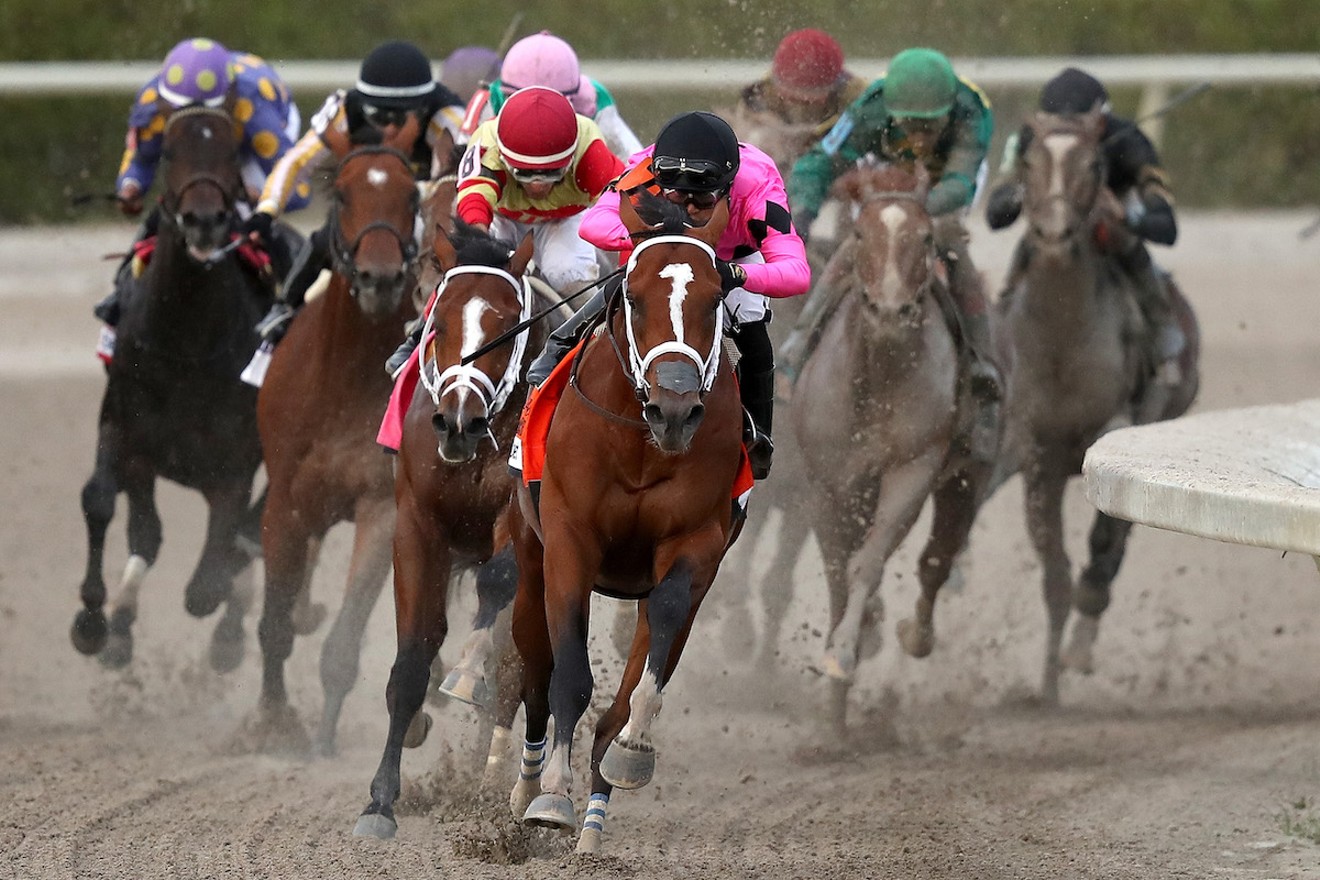Critics of horse racing make arguments like these.
At Gulfstream Park, 34 horses have died so far this year. Yet the Hallandale Beach thoroughbred racetrack, which hosts weekly stakes races whose purses can top $1 million, commenced its 2019-2020 championship meet today.
Right on schedule.
Tomorrow, Horseracing Wrongs, a nonprofit committed to ending the sport in the U.S., will be at the track to protest.
Gulfstream is owned by the Stronach Group, a Canadian company that owns six other U.S. tracks, including Santa Anita Park outside Los Angeles, which made national headlines in October when its equine death toll dating from December 2018 hit 35. (The count now stands at 37; the last horse to die during the track's fall meet was Mongolian Groom, injured during the running of the $6 million Breeder’s Cup Classic on November 2 and subsequently euthanized.)
The media scrutiny that has descended upon Santa Anita as its equine death toll has risen — and the public outcry that has ensued — inspired South Florida members of Horseracing Wrongs, who hope the current climate signals shifting attitudes about what they call a blood sport.
“Racetracks are closing, public opinion is swaying — people are becoming more conscious to the suffering of animals used in sports and entertainment,” says animal-rights activist Holly Wilson, who organized the Hallandale Beach protest.
Wilson, an emergency medical doctor based in Pompano Beach, says public opinion does affect how animals are treated: Sea World’s reputation still hasn't recovered from the negative publicity unleashed with the 2013 release of the critically acclaimed documentary Blackfish; persistent activism helped lead to the shuttering of Ringling Bros. Circus; and last year in Florida, voters overwhelmingly passed Amendment 13, which banned greyhound racing.
Gulfstream’s death toll reached 34 on September 27, when Rock You was bumped by another horse early in the sixth race. According to the published race chart, the five-year-old gelding was "bumped at the start and lacked early response, raced along the outside entering top stretch then took a bad step and unseated the rider, was quickly caught by the outrider then was euthanized on the track."
Owned by Hialeah businessman Amancio Alonso, Rock You had begun his racing career in 2015. He'd raced 25 times, with six wins, five second-place finishes, and two thirds.
The Equibase report from Gulfstream Park's sixth race on September 27, 2019, detailing Rock You's last race.
The deaths vary in details and manner — some animals are fatally injured on the track or euthanized on-site or later, after examination, but others are found dead in their stalls.
New Times reached out to Gulfstream for comment, and the Stronach Group emailed the following statement:
"At Gulfstream Park, as with all Stronach Group-owned properties, we are committed to protecting the safety of the horses and jockeys who race and train at our facilities. In 2019, Gulfstream Park has been below the national average for equine fatalities.
"The Stronach Group is fully committed to implementing standards consistent with, or better than, those of the International Federation of Horseracing Authorities at all of our facilities. We appreciate that each jurisdiction in which we operate is uniquely governed but our goal is to work with our industry partners in each of those jurisdictions to bring about critical reforms and improved horse and rider safety standards."
Holly Wilson's goal is to eliminate horseracing entirely. "A horse can live to be 30, yet most are killed by the time they are 5,” she says. "During their unnaturally short lives, they are not free to engage in any normal or natural activity. They are in solitary confinement for up to 23 hours a day."
According to American horse-racing's governing body, the Jockey Club, thoroughbreds averaged right around six starts per year in 2018; the number has held steady over the past decade and is about half what it was during the 1960s. Top-tier horses are raced less frequently than those who run for smaller purses.
“Animals utilized in sports and in entertainment have been reduced to a commodity — they are a means to an end," Wilson argues. "They are merely objects that are to be used, abused, and replaced or killed when no longer of value."
The protest at Gulfstream Park is scheduled for Saturday, November 30, from 11 a.m. to 1 p.m. Gulfstream Park is located at 901 South Federal Hwy., Hallandale Beach.











